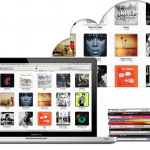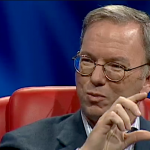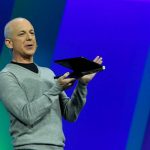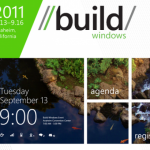Higher Ed should get over its love affair with iPad

It's no secret iPad owners love their devices. The American Customer Satisfaction Index and NPD both report unusually high satisfaction rates for iPad. Just in second quarter, Apple sold more than 9 million tablets, generating $6 billion in revenue. Despite the best efforts of competitors, most of which offer tablets running Android OS, nothing has yet put a dent in iPad’s dominance among consumers. The fact of the matter is that, if you own a tablet right now, it most likely is iPad.
There’s another group equally smitten by iPad: higher education. I’m not talking about students, faculty or university administrators that own the tablets (I would lump these people in with the consumer category), but rather the growing number of higher-ed institutions around the country that currently issue iPads to their students.
iCloud is Apple's killer app

In March 2008, I wrote at Microsoft Watch: "Synchronization is today's killer application. It's either kill or be killed. If Microsoft doesn't strike the deadly blow first, Google will". Google got sync right first, but sometimes latecomers are the talk of the party, as Apple is today with the release of iCloud.
I'm not sure how many people get what iCloud is -- and more importantly what it is not. The service isn't an online storage space like DropBox. iCloud is fundamentally a synchronization service -- more importantly a push sync service. It's the feature many iOS device users will find they can't do without, and it's every company's dream product: Something that locks users into a broader platform, as Microsoft did with file formats and Office during the 1980s and 1990s.
Did Google and Samsung do what Apple wouldn't?

Yesterday, after having raised anticipation with event invite, video and other teasers, Google and Samsung delayed the presumed launch of Android 4.0 (aka Ice Cream Sandwich) and Nexus Prime (or whatever the smartphone is called). The announcement is hugely important to both companies -- really more than iPhone 4S is to Apple -- because Ice Cream Sandwich closes the fork between Android 2.x for phones and 3.x for tablets. Reason for cancelling the October 11 event: "We believe this is not the right time to announce a new product as the world expresses tribute to Steve Jobs's passing". So what? Google and Samsung show respect for Jobs, but Apple doesn't?
Apple announced iPhone 4S on October 4. A day later, the company revealed that Jobs, Apple's chairman and until late-August its CEO, had died. The world is mourning the loss of one of the rarest of humans -- a true visionary who compelled loyalty among the people closest to him and those who used Apple's products, in part by aspiring for something better. How does Apple remember Jobs? By keeping business as usual.
Delaying Nexus Prime-Android 4 launch -- because of "Steve Jobs' passing" -- lacks business logic

Friday, Samsung and Google postponed what could be one of the most significant Android device launches in awhile -- likely the Nexus Prime -- scheduled for next Tuesday, October 11. The original statement was somewhat vague, but disclosed that both parties agreed that "it was not the appropriate time" to release the device.
"Samsung and Google have decided to postpone the Samsung Mobile Unpacked event during the CTIA in San Diego, previously scheduled for Oct. 11. Under the current circumstances, both parties have agreed that this is not the appropriate time for the announcement of a new product. We would ask for the understanding of our clients and media for any inconvenience caused. We will announce a new date and venue in due course."
What the passing of Steve Jobs says about us

"Suit the action to the word, the word to the action, with this special observance, that you o'erstep not the modesty of nature: for any thing so o'erdone is from the purpose of playing, whose end, both at the first and now, was and is, to hold as 'twere the mirror up to nature: to show virtue her feature, scorn her own image, and the very age and body of the time his form and pressure". -- Hamlet Act 3, scene 2, 17–24
One thing that struck me about the passing of Steve Jobs is the level of emotion so many people feel. The outpouring of support and genuine sense of loss for a person that most people never met reminds me a bit of when Princess Diana died tragically. The emotion expressed over Diana’s passing was easy for me to understand. Diana was a state sanctioned celebrity, a real life embodiment of the fairy tales those in Western society grow up on. That coupled with her beauty and grace and life touched by scandal made it understandable why people would feel some kind of personal connection to her. The heroine from their fairy tales had been tragically taken away.
You can have iPhone 4S, I'll take Samsung Galaxy S II

I suspected for some time that rumors of iPhone 4S were correct. That meant, based on past Apple release schedules, the new handset would be more evolutionary than revolutionary and likely nothing more than catch-up to newer Android models from HTC and Samsung. So on Sunday, while the InterWeb filled with excitement and speculation about iPhone 5, I trucked over to AT&T and bought Samsung Galaxy S II, which went on sale that day.
Apple announced iPhone 4S yesterday, and I have no regrets choosing the S2. I have absolutely no interest in Apple's new handset and wouldn't if I still owned iPhone 4. For Android users tempted by Apple marketing, don't be. Nexus Prime is coming, and Galaxy S II is here now. It's an exceptional smartphone by most every measure. With iPhone 4S, Apple is the innovation follower, not leader here.
I'll buy the iPhone 4S, and so should you

Woe is you.
You've waited 16 months for this announcement, and all you get is a stinking upgrade to the iPhone 4? You know, that doubling of processor speed and drastic increase in graphics handling isn't enough. The fact that CDMA customers will have worldphone capability thanks to dual-mode functionality? Pshaw.
Google just doesn't 'get it'

Contrary to testimony given before the US Senate yesterday, Google has not learned lessons from Microsoft's antitrust case -- not enough of them, or the right ones. More importantly, Google is looking at the wrong company. It is Intel's dealing with the Feds that could help Google navigate the shark-infested regulatory waters before it.
If the company fails to respond, and quickly, regulators will step in. Google can only avoid being eaten by way of contrition and compromise, and Executive Chairman Eric Schmidt didn't signal enough of either during his prepared statement or responding to questions that followed.
Facebook, stop it, just stop it

On the same day that Google+ opened itself up to the masses, Facebook launched its latest redesign. The change seems almost ironic considering the opposite trajectories these two social networks are on: Google+ on the way up, Facebook on the way down.
Forget the hit piece that journalism professor Dan Reimold wrote earlier this week for PBS calling Google+ a "ghost town." Even if Reimold's premise was even remotely correct (he needs to remember that up until now, Google was invite-only so of course usage is sparse), that's about to be blown out of the water.
Sony, I won't sign away my right to sue

Sony sure has some gall to attempt to prevent you or me from suing them, especially for its own stupidity. Late last week, the company made some key changes to its terms of service which effectively takes away your right to sue.
After accepting the new ToS, arbitration through a Sony-selected arbitrator is your only recourse. Worse yet, you give up the right to launch or join class action suits against the company.
Steven Sinofsky is the new Steve Jobs

Don't laugh. I'm quite serious.
Yesterday during the Day 1 BUILD developer conference keynote, Steven Sinofsky delivered one of the most inspiring new Windows introductions ever. He was energetic and engaging. He honed in on key product benefits -- and that's tough to do with Windows because of the breadth of supporting third-party products and connection to Microsoft stuff like Windows Phone 7.5 or Live services. He spoke aspirationally and convincingly about Windows 8's benefits to developers and their customers. Apple Chairman Steve Jobs couldn't have done better. Whereas, Jobs casts the so-called "reality distortion field", Sinofsky brought reality into focus.
We need an international police force to fight cybercrime

In the real world, you only have to worry about the criminals who live in your city. But in the online world, you have to worry about criminals who could be on the other side of the planet. Online crime is always international because the Internet has no borders.
Today computer viruses and other malicious software are no longer written by hobbyist hackers seeking fame and glory among their peers, but by professional criminals who are making millions with their attacks. These criminals want access to your computer, your Paypal passwords and your credit card numbers.
5 Things Microsoft should do at BUILD

Can you hear it? Can you hear it coming? Microsoft's Windows developer conference is almost here. BUILD kicks off September 13 in Anaheim, Calif., and it's going to be big, big, BIG. Microsoft will give Windows 8 its formal unveiling -- everything else before was just movie previews. No new Windows version is really official until Microsoft presents it to developers.
But there's more. Microsoft moved its annual Financial Analyst Meeting from July to September, coinciding with BUILD. It's a colossally smart move. Wall Street geeks and technophobes will have chance to get caught up in the energy and enthusiasm of Windows 8 -- and Windows Phone "Mango", too. Microsoft really needs to energize analysts about these products and how they're not so much the past but vital forces for the so-called post-PC era.
TechCrunch just exposed what is wrong with tech journalism today

Ed Oswald argues that TechCrunch embodies some of the worst ethics in journalism today. In counterpoint "AOL will ruin TechCrunch," Joe Wilcox argues that under Huffington Post management the tech site's good original reporting will greatly diminish.
I have been thinking about writing a story on the sorry state of tech journalism for a good part of my seven years in this business. Why's that? All too often objectivity, ethics and accuracy seem to have taken a backseat 'round these parts.
AOL will ruin TechCrunch

Joe Wilcox argues that TechCrunch produces boatloads of original content using a method called process journalism. In counterpoint, "TechCrunch just exposed what is wrong with tech journalism today", Ed Oswald contends that the blog is rife with conflict of interest and questionable news reporting ethics.
Have you been on the Internet long enough to remember Global Network Navigator -- yeah, that's GNN. It was the first web portal I used to get news and quick access to other useful sites. O'Reilly & Associates (now O'Reilly Media) launched the site in 1993. AOL bought GNN in 1995 and closed it in 1996, quite unceremoniously. The domain is still active and points to Huffington Post. Old-time Netters will remember GNN and a long list of other properties and products purchased by AOL that were later abandoned or closed -- all part of a decade-and-a-half plan to reinvent as a new media company.
Recent Headlines
Most Commented Stories
BetaNews, your source for breaking tech news, reviews, and in-depth reporting since 1998.
© 1998-2025 BetaNews, Inc. All Rights Reserved. About Us - Privacy Policy - Cookie Policy - Sitemap.